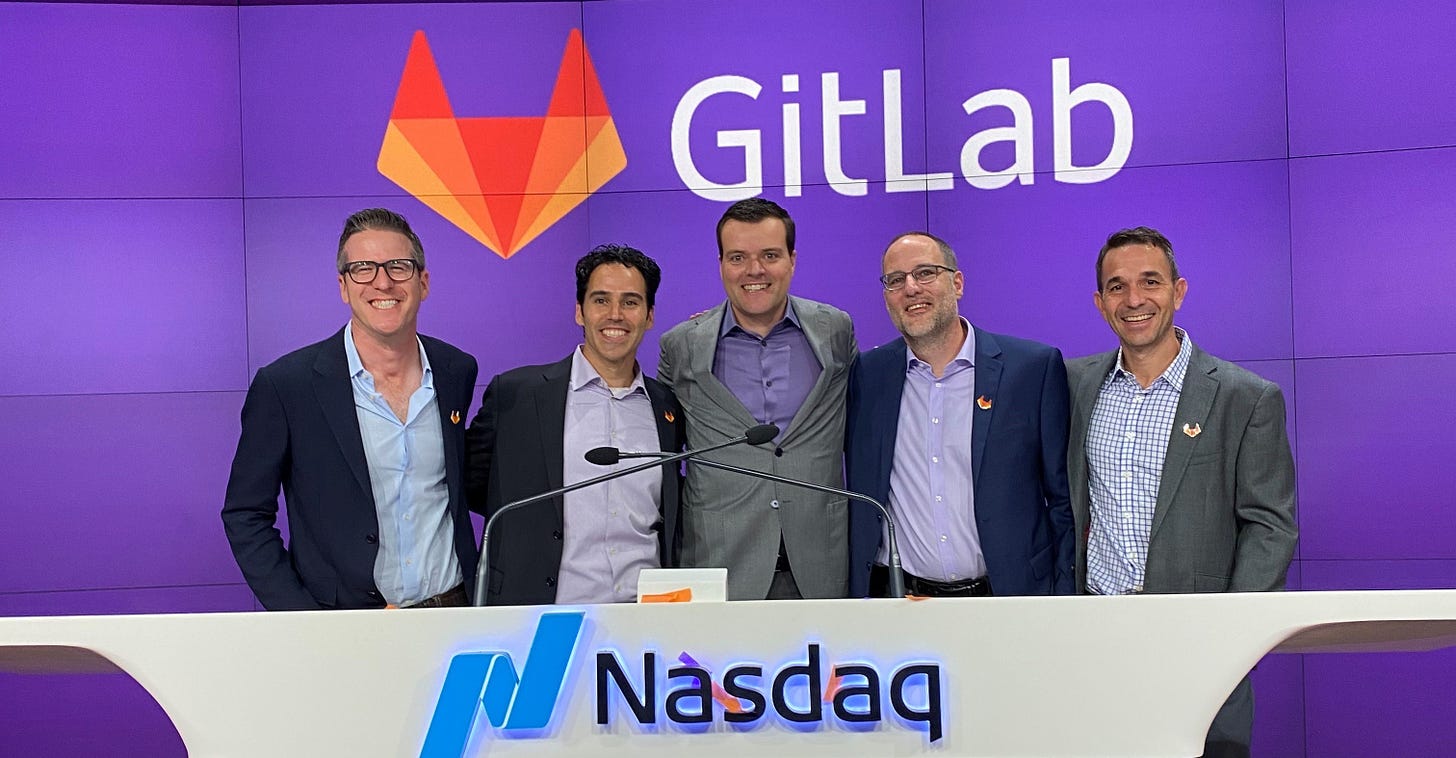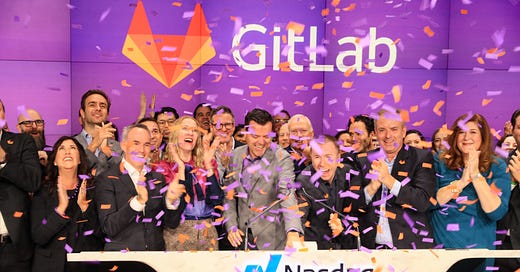Newcomer's Greatest Hits: The Story of the GitLab Cap Table
Tomorrow we’ll publish an exclusive interview with Vinod Khosla. Here’s a story about one of Khosla Ventures best exits.
In celebration of Newcomer’s second anniversary, we’re re-running a few of our best stories that you may have missed.
Tomorrow we’ll publish a new exclusive interview with Vinod Khosla. Until then, here’s a story about one of Khosla Ventures best exits from the Newcomer archives.
Today, GitLab is worth $7.4 billion. Its market capitalization is almost half of what it was when I published the story in October 2021.
Get a paid subscription for access to the entire post, Newcomer’s archive, and future exclusive information and insights. An annual subscription is available on a special anniversary offer for $99.50 through October 31 (and will be $199 thereafter).
This story originally ran in October 2021.
The Story of a Cap Table: GitLab
From his perch as Y Combinator’s chief operating officer, Qasar Younis alerted investor Ben Ling, Younis’s old boss from their time at Google, whenever he saw a particularly promising startup making its way through YC’s accelerator program.
So that’s how Ling, a prolific early-stage investor who was working as a partner at Khosla Ventures, found himself with back-to-back meetings on March 18, 2015, at Roka Akor in San Francisco.
From 8 p.m. to 8:40 p.m. Ling met with Sytse “Sid” Sijbrandij, the founder of GitLab, a late-to-the-game GitHub competitor with broad ambitions to attack GitHub’s code repository business for enterprise customers. (After that, Ling met with the founder of commuter shuttle company Chariot. He didn’t invest.)
Ling came away from the meeting with Sijbrandij upbeat. He emailed his partners at Khosla, “just met with these guys. Worth meeting. They are deciding whether to raise a seed (1M) or an A and would like to have something wrapped up before demo day.”
Sven Strohband, Khosla’s chief technical officer at the time, replied: “Where are you on them? Positive? If so what funding context?”
Ling replied, “I am positive on them; I haven’t studied github sufficiently to determine their relative merits but they have sufficient customer and revenue traction for us to evaluate seriously.” He concluded, “If you guys like I could easily see us investing $1M to get 10%.”
Strohband ended up leading GitLab’s seed round for Khosla before the company presented at YC Demo Day. “These guys had not only taste. They also had empathy for developers.”
Ashton Kutcher’s Sound Ventures, Liquid 2 Ventures, Ilya Sukhar, 500 Startups, and FundersClub were among the investors in the round, according to Pitchbook. The $1.7 million round valued GitLab at just $13 million.

Coming out of Y Combinator, GitLab caught the attention of August Capital associate Abie Katz, who discovered GitLab on Hacker News. He pushed his firm to lead GitLab’s Series A round. Katz and August partner Tripp Jones brought GitLab in to meet with the partnership.
The company seemed like “the antithesis of everything a smart VC held to be true,” one person close to the deliberations told me. GitLab is based on an open-source project — a strategy that was less understood at the time. GitLab was fully remote back before the pandemic reoriented everyone’s thinking about remote companies. And GitLab was competing with two well-established market leaders in GitHub and Atlassian.
While GitLab had some promising signs — the company already had Apple as a customer and a “three-letter” government agency as one of its users — August passed on the Series A round. Some of the firm’s partners were skeptical of GitLab’s approach.
Over at Khosla, Strohband led the Series A. The firm invested $4 million at a $22.7 million pre-money valuation. “There wasn’t much deliberation. I really wanted to do it,” Strohband says.
He remembers meeting Sijbrandij at Khosla’s offices to negotiate terms and then going to lunch, leaving the lawyers to haggle over the specifics.
Bruce Armstrong, an operating partner at Khosla, took a board seat. He’s helped the company hire some of its key finance executives over the years. Armstrong just stepped off GitLab’s board ahead of the IPO.
Khosla was the largest single GitLab shareholder outside of Sijbrandij, according to GitLab’s IPO filing.
At the time of the IPO, Khosla owned 14.1% of the company. The firm had 19 million shares.
At GitLab’s current stock price, Khosla’s stake is worth about $2 billion. The firm invested $12.75 million in GitLab altogether, including some pro rata in the Series B.
That’s a more than 150X return for Khosla.
Meanwhile, Katz, the August Capital associate, remained excited about GitLab’s promise, though he seemed skeptical a deal would ever come together at August and worried that GitLab could have trouble competing with GitHub. Still, Katz brought up the company regularly inside August Capital.
Then in May 2016, Villi Iltchev joined August as a partner after working as an executive at Box, LifeLock, and Salesforce. Importantly, Iltchev had looked into GitHub as part of Salesforce’s acquisition of Heroku.
Katz and Jones introduced Iltchev to the company and finally the firm had a partner prepared to fight for the deal.
Within 50 days of joining August Capital, Iltchev brought the deal to his partners. “I was like, ‘Guys I think we should do this. This seems really exciting.’”
Sources told me that August Capital’s partnership was decidedly of mixed minds about making an investment. Notably, David Hornik, who had been the first investor in Splunk, had some reservations about the deal, sources told me.
Hornik wrote me in an email, “Everyone had some reservations about the deal. It was anything but a sure thing at that time. I was no more vocal about my reservations than anyone else. We all had concerns about a dominant competitor. We all had questions about the distributed nature of the team,” Hornik wrote. “But we also all saw a big, exciting opportunity to build an end to end dev ops platform. We all discussed appropriate terms for the investment and then collectively worked hard to convince Sid to take our money.”
Iltchev wouldn’t talk about the partnership deliberations, saying only, “not every deal is high fives, but certainly I got support from my partners to do the deal for which I’m grateful.”
August Capital invested $14 million in the Series B and another $1.5 million after that. The firm held an 11.1% stake in GitLab at the time of the IPO. The stake is worth about $1.6 billion.
That’s a more than 100X return for August Capital.
In 2017, GV convinced GitLab to take the firm’s money. GV had looked at GitHub over the years and started chasing GitLab the year prior.






